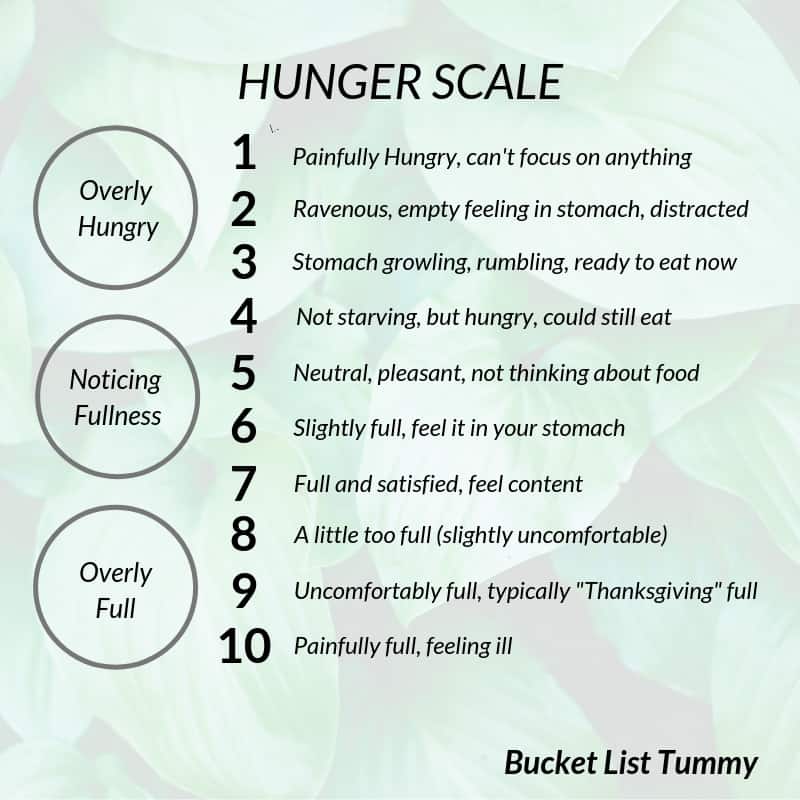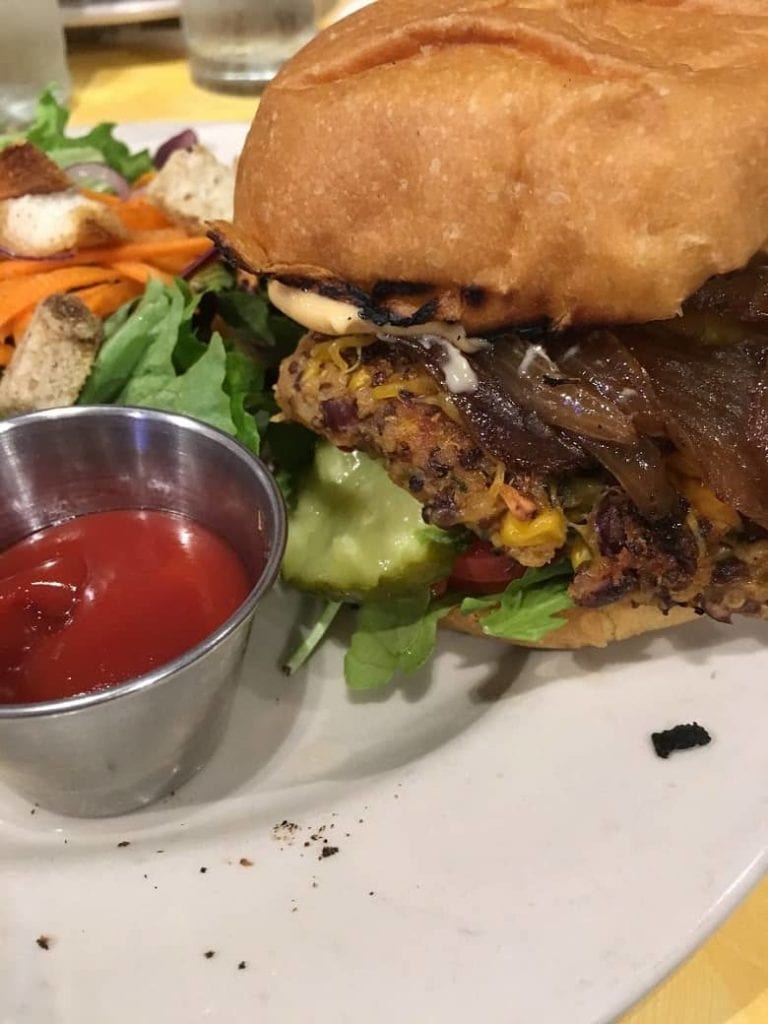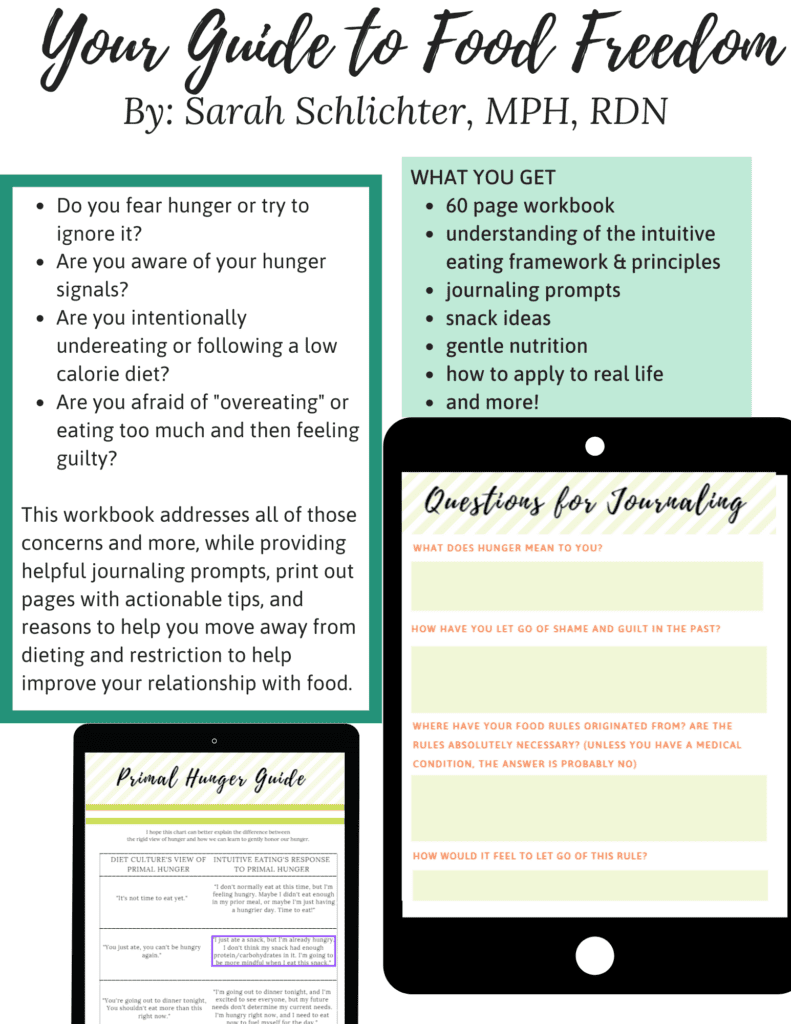Challenging Your Fear of Hunger
- May 17, 2022
- Last Updated: March 20, 2024
- 40 Comments
- Intuitive Eating
For many of us, a fear of hunger happens when we have a distorted relationship with food and we don’t trust our bodies.
We have anxiety when hungry because we don’t know how to handle these physical, mental and emotional feelings that we’ve tried to suppress for so long.
As an Amazon Associate, I may earn from qualifying purchases. You can read more here on our Disclaimer and Privacy Page.
It all comes down to a cycle, really. We fear hunger because we fear overeating, and then we fear fullness.
It’s a constant cycle that really gets us nowhere, and takes up a lot of mental space!
If you’re confused about hunger signs and how to honor them, here’s a post about honoring your hunger, which is first and foremost.
Your fear of hunger doesn’t need to prevent you from nourishing your body and eating foods you love.
There is a middle ground of learning to trust your body’s cues, honoring those cues, and moving on with your day.
This post will break down where this idea of anxiety about hunger comes from, and how to dismantle those thoughts.
If we don’t know what our hunger signs are, it’s a lot harder and more nuanced than it already is! This is where the fear of hunger comes from.
Physical Signs of Hunger
Sometimes, it can be difficult to differentiate between physical hunger vs. emotional hunger.
Some signs of physical hunger include:
- growling stomach
- thinking about food
- inability to concentrate
- fatigue
- dizziness
- pit in stomach
- general discontent
These are some of many, and many are individualized, based on the person.
We often use the intuitive eating hunger scale to learn to get back in touch with what hunger and fullness feel like.

Where Does the Fear of Hunger Come From?
After struggling with an eating disorder or disordered eating, we learn to not trust ourselves.
In fact, we try to ignore signs of hunger from our body. Since we don’t trust ourselves, we don’t think we deserve to eat. This is not rational thinking.
This leads to a very distorted way of looking at food, and unfortunately, undereating.
Many people with distorted eating habits may later go on to develop relative energy deficiency.
Many of my clients come to me about arbitrary food rules and feeling out of control around food they have in their head, especially about snacking.
If it’s not a certain time, they believe they can’t eat, even if they are hungry.
The funny thing is, these times are times that they have subjectively chosen as their feeding times.
These are arbitrary food rules formed by the food police, and making peace with food and practicing food flexibility is important in helping to dismantle these.

Hunger is a Good Thing
In these situations, I try to explain to them that the feeling of hunger is a gift.
It’s a sign that our bodies are working and need fuel to continue working (more on that here).
I explain that their eating times will be different from my eating times, because we are all different people.
We’ve exercised differently, we’ve consumed different amounts of fluid, we’re built differently, we’re experiencing different stressors, etc. The list goes on.
No two people will be the same, so it is futile to try to fit in the mold of eating at “normal” times. Your normal eating is different from my normal.
Some people need to eat every two hours, others every three hours.
Some people can get by on eating every four hours. <- That is not me, and I’m okay with it.
Our Bodies Control When We Eat
I also tell them that our brains don’t control when we are hungry and need to eat – our bodies do.
It takes time to understand what our body is telling or asking of us. We can become out of sync or rhythm with our bodies when we don’t listen, or constantly ignore hunger.
The 10 principles of intuitive eating help us get back in touch with our bodies.
Imagine your gas light blinking that your fuel was low. What would happen if you ignore it too long? You’d be in trouble and stuck.
Well, it’s similar with food. We get “stuck” in that we lose those cues from our body.
If we constantly ignore our hunger signals and try to wait it out to the next meal time, chances are we will overeat at that meal because we are already out of touch with what our body was trying to tell us.
Or, if we ignore hunger signals, food will take up more mental space.
We’ll continue to think about food, because our body is telling us it needs energy.
We may think about highly palatable food options, or foods that we perceive as “off limits.”

When you don’t know what to eat, think about what you actually like to eat.
Since our bodies are pretty smart, we want to listen to them. We WANT to develop that trust.
We want to take the time to reframe disordered thoughts into rational thoughts.

Maybe we ate breakfast a little earlier, so we’re hungrier for our snack a little earlier. Or maybe we left out some essential protein and fat in our prior meal, so we’re not satiated as long.
I use this list of healthy athlete snacks with many of my clients to urge them to keep shelf stable snacks on hand. Thrive Market is great for this!
The more we ignore the hunger signs, the less our bodies will consistently tell us when they need fuel.
Undereating can be cumulative and take time for the body to catch up on.
By that I mean, if you underrate a few days ago, your hunger cues could be stronger in the following days.
The body is smart and will try to maintain equilibrium or a balance to the best of its ability.
It will work to maintain your weight and keep it constant.

Eating is a Process, Not a Destination
There is a theory called the set point theory.
This theory recognizes that our body will regulate itself to a predetermined, natural weight, despite attempts to change it.
The body will naturally settle at where it is supposed to be through feedback control mechanisms.
This video, called Poodle Science, provides a great explanation!
In other words, no matter how hard you try to override your body’s natural happy point, your body will always do its best to return to this point.
Eating is fluid – we’re constantly learning as we go. There have been many times when I haven’t recognized or listened to my hunger cues.
I have been there and thought, “I can wait another hour until lunch,” or, “I just ate my morning snack. I can’t eat again until after lunch.”
Eating may have seen as an inconvenience at the time, but it may have been exactly what my body needed to perform for me.

Or, on the flip side, I’ve eaten past my satiety level, and felt full for hours.
This is a normal part of eating too, and learning to respect and feel your fullness is a must for improving your relationship with food.
There is no perfection because there is not an end goal to reach once and be done with it.
Intuitive eating is a constant process and practice makes perfect.
So, the next time you’re beating yourself up about being hungry, realize that it could be that your body is catching up from previous underfueling.
Or, maybe your body is just working harder that day, your hormones are working differently, you didn’t sleep well the night before, you’re recovering from a different workout, etc.
Grab Our Meal Prep Ebook to Finally Conquer Meal Prep in the Kitchen

And sometimes there is no explanation as to why you are hungrier – you just are. The fear of being hungry comes from constant undereating.
Don’t feel shameful about feeling hungry. Be happy that you have the opportunity to feed that hunger. And be happy that you have those hunger cues established in the first place.
Remember that each time you listen to those hunger cues, you are building on a foundation of trust for your body. It gets easier over time.
Support Bucket List Tummy



























Like This Content?
Support Bucket List Tummy